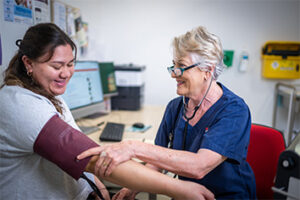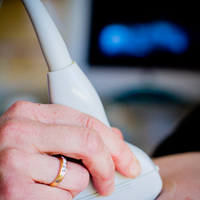Choosing the best care for you

Most women will experience an uncomplicated pregnancy and birth; however, a number of women will require more specialised care during this time. We provide various midwifery-led and obstetric care options.
When your GP makes your referral to us, they will note your antenatal care preference.
All women, regardless of their care option, will have their first visit with a midwife at the hospital. Your first visit will include a comprehensive discussion about your medical history, family history, previous pregnancy history and an assessment of your current pregnancy. This is to determine ways we can provide you with appropriate care and support throughout your pregnancy and to ensure your pregnancy care meets your needs.
Central Coast Health also offers a birth and parenting course to provide information on labour, birth and beyond. More information on the course can be found below.
![]() Antenatal Clinic Visits – What to expect from your pregnancy visits – First baby
Antenatal Clinic Visits – What to expect from your pregnancy visits – First baby
![]() Antenatal Clinic Visits – What to expect from your pregnancy visits – Subsequent babies
Antenatal Clinic Visits – What to expect from your pregnancy visits – Subsequent babies
Care options
Early Pregnancy Assessment Service
If you are less than 20 weeks pregnant and bleeding or have significant pain, please see your GP, present to your closest emergency department or contact our Early Pregnancy Assessment Service (EPAS).
EPAS is an appointment only service which operates Monday to Friday for women experiencing threatened miscarriage, ectopic pregnancy or with abnormal results. You can self-refer to EPAS or you can be referred by your GP or the emergency department. You can call EPAS on 02 4320 3264.
![]() Early Pregnancy Assessment Service – EPAS (PDF, 72 KB)
Early Pregnancy Assessment Service – EPAS (PDF, 72 KB)
Midwifery Group Practice (MGP)
A midwife, within a small team, provides most of your pregnancy care from booking in until after the birth of your baby.
Usually, care is provided by two midwives throughout your pregnancy who are also on call for your birth. MGP helps you establish a relationship with your midwife who provides ongoing education and support. Low risk pregnant women, receiving care from MGP, may be offered the option of a homebirth.
Community Midwife Program (CMP)
Based at Gosford Hospital this team provides a family centred midwifery service aiming for continuity of care through pregnancy, childbirth and after the birth of the baby – in hospital and at home.

Midwifery Antenatal Care (MAC)
We offer midwifery-led antenatal clinics at both Gosford and Wyong hospitals, as well as outreach clinics in community centres enabling you to access some antenatal care closer to home.
Shared care with your GP
Your GP provides most of your antenatal care and refers you to the hospital if you experience complications. You birth your baby at the hospital.
![]() Antenatal Share Care with your GP
Antenatal Share Care with your GP
Aboriginal Maternal Health Service (AMIHS)
This service provides continuity of antenatal care for aboriginal families in outreach clinics. Support is provided following birth for up to two months.
![]() Aboriginal pregnancy, ‘NGIYANG’ service
Aboriginal pregnancy, ‘NGIYANG’ service
Care with a private obstetrician
Women seeing a private obstetrician may birth at Gosford Hospital as a private patient. Women choosing this option of care will see their obstetrician for all their antenatal care in their obstetrician’s private consulting rooms.
You’ll need to contact your obstetrician early in your pregnancy to book in with them and discuss birthing at Gosford Hospital.
High risk pregnancies
Obstetric doctors run clinics at Gosford Hospital for women needing specialist care for pregnancy due to health or pregnancy complications, for example:
- a previous pregnancy requiring specialist care and/or hospitalisation
- a pregnancy that is not progressing normally
- a multiple pregnancy, for example twins
- diabetes and/or other conditions.
Birth and Parenting course
Central Coast Health offers a birth and parenting course, consisting of four sessions. Each session is two hours long and a support person or partner is welcome to attend with you. Cost is $50 per attendee.
You can choose to attend the course at either Gosford or Wyong Hospital – courses run throughout the year, more information on available dates can be found at the booking link below:
- Gosford Conference Centre – Tuesdays, 6 to 8pm
- Wyong Education Centre – Thursdays, 6 to 8pm
Over the four sessions, topics covered include:
- Labour and birth
- The role of the nervous system
- Stages of labour
- Comfort measures during labour (natural and medical)
- Types of intervention
- Informed decision-making
- ‘Birth mapping’
- Pelvic floor health
- Breastfeeding
- Recovery after birth
- Becoming a family.
![]() Birth and Parenting course bookings
Birth and Parenting course bookings
Please complete the booking form and our team will be in touch via email with details on class availability and dates.
